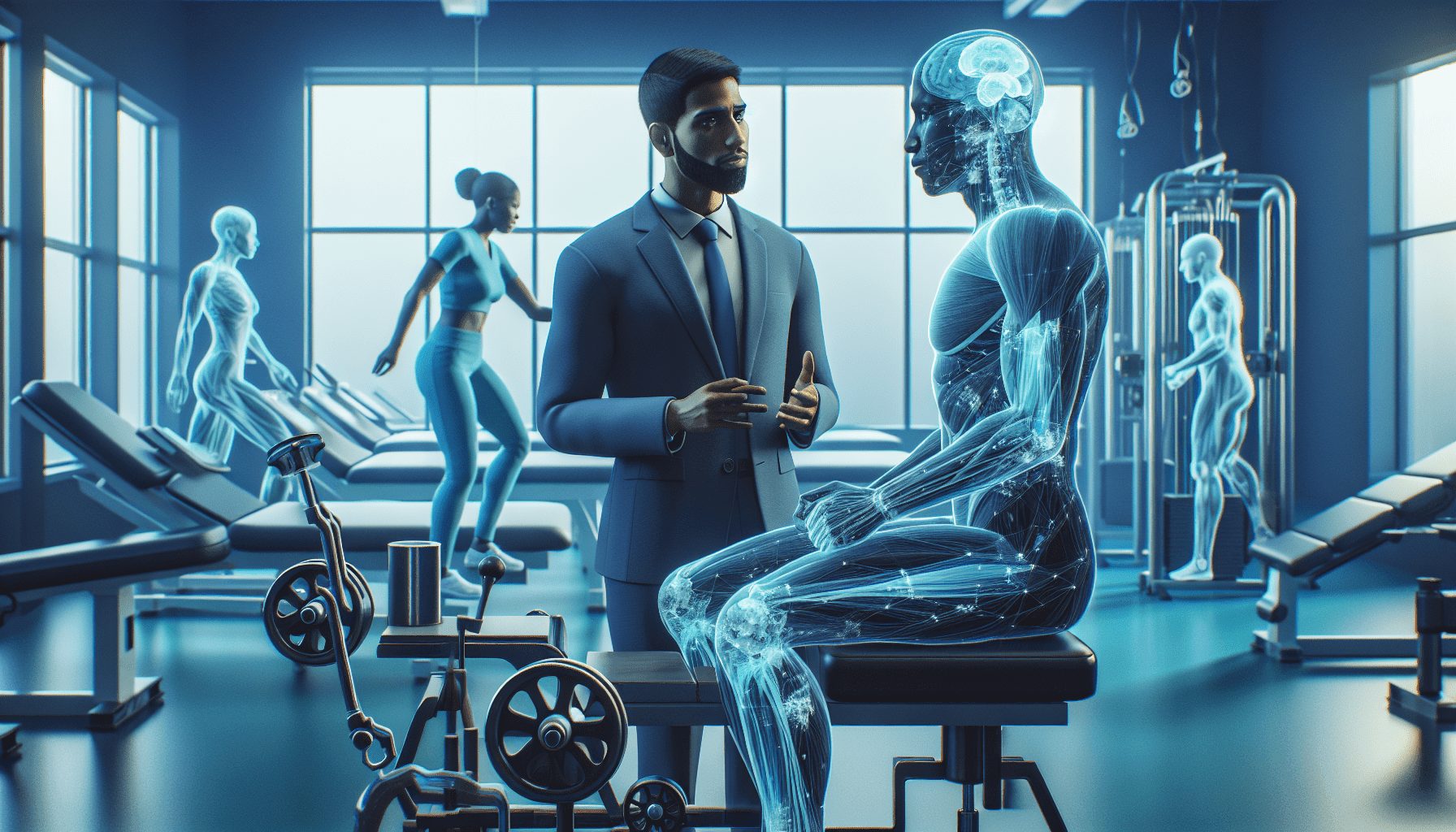AI Recruiter: How They Revolutionize the Hiring Process
Overview of AI in recruiting
In the ever-evolving landscape of recruitment and hiring, the integration of Artificial Intelligence (AI) has emerged as a game-changer. With its ability to streamline processes, enhance efficiency, and improve overall decision-making, AI has revolutionized the way organizations approach talent acquisition.
AI in recruiting refers to the utilization of advanced algorithms and machine learning techniques to automate various stages of the hiring process. From resume screening to candidate assessment, AI has the potential to transform traditional recruitment practices, making them more effective and efficient.
One of the key areas where AI has made a significant impact is resume screening. Traditionally, recruiters have been burdened with the tedious task of manually sifting through numerous resumes to find the most suitable candidates. However, with the advent of AI-powered tools, this process has become much more streamlined. AI recruiters can quickly analyze and evaluate resumes, identifying the most relevant candidates based on predetermined criteria such as skills, qualifications, and experience.
Another area where AI has brought about significant change is candidate sourcing. Traditionally, recruiters have relied on various channels such as job boards, social media, and professional networks to find potential candidates. However, AI-powered tools can now intelligently search and analyze vast amounts of data, allowing recruiters to identify and target candidates who possess the desired skills and qualifications.
The interview process is another stage where AI has made a considerable impact. AI-powered chatbots and virtual assistants are now being used to conduct initial screening interviews, saving recruiters valuable time and effort. These chatbots can ask pre-determined questions, assess candidate responses, and provide real-time feedback. This not only helps streamline the interview process but also ensures a consistent and unbiased experience for all candidates.
Additionally, AI plays a crucial role in candidate assessment. AI-powered tools can analyze candidate responses, assess their skills and competencies, and even predict their future performance based on historical data. This enables recruiters to make more informed decisions and select candidates who are the best fit for the role and the organization.
The integration of AI in recruiting offers numerous benefits. Firstly, it significantly improves time and cost efficiency. By automating repetitive tasks and reducing manual effort, AI enables recruiters to focus on more strategic aspects of the hiring process. This, in turn, leads to faster and more cost-effective recruitment cycles.
Furthermore, AI enhances candidate matching. By leveraging advanced algorithms, AI recruiters can analyze large volumes of data and identify candidates who closely align with the job requirements. This ensures that the candidates being considered are not only qualified but also possess the necessary skills and experience for success in the role.
Another advantage of AI in recruiting is the reduction of bias. Traditional recruitment processes are susceptible to unconscious biases that may influence decision-making. However, AI-powered tools can eliminate or minimize these biases by evaluating candidates solely based on objective criteria, such as qualifications and experience. This promotes fairness and diversity in the hiring process.
Lastly, AI contributes to an enhanced candidate experience. By utilizing AI-powered chatbots and virtual assistants, candidates can receive timely updates, personalized feedback, and a smooth and efficient application process. This not only improves candidate satisfaction but also enhances the overall employer brand.
While AI brings significant benefits to the hiring process, it is important to acknowledge the challenges and considerations that come with its implementation. Ethical concerns surrounding the use of AI in recruitment, the need for human intervention to ensure fairness and judgment, and the importance of data privacy and security are all factors that need to be carefully addressed.
In the following sections of this article, we will delve deeper into the role of AI in the hiring process, explore the benefits it brings, discuss the challenges and considerations, highlight popular AI recruiting tools and platforms, and envision the future of AI in recruiting. Stay tuned as we uncover the transformative power of AI in revolutionizing talent acquisition and shaping the future of recruitment.
The Role of AI in the Hiring Process
In today’s rapidly evolving job market, AI (Artificial Intelligence) has emerged as a game-changer in the hiring process. Employers and recruiters are increasingly turning to AI technologies to streamline and optimize their recruitment efforts. From resume screening to candidate sourcing, interview process, and candidate assessment, AI is revolutionizing every step of the hiring journey.
Resume Screening
Gone are the days of manually sifting through stacks of resumes to identify the most qualified candidates. AI-powered resume screening tools can now analyze resumes and extract relevant information such as work experience, skills, and education. These tools use sophisticated algorithms to compare candidate profiles against predefined criteria, enabling recruiters to identify the top candidates quickly and efficiently. By automating the initial screening process, AI reduces the time and effort spent on reviewing hundreds of resumes, allowing recruiters to focus on more strategic tasks.
Candidate Sourcing
Finding the right candidates is often a challenging and time-consuming task for recruiters. However, with AI candidate sourcing tools, this process has become more efficient and targeted. These tools leverage data from various sources, including job boards, professional networking sites, and social media platforms, to identify potential candidates who match the desired skills and qualifications. By using advanced algorithms and machine learning, AI can analyze vast amounts of data in seconds, presenting recruiters with a pool of highly relevant candidates. This not only saves time but also improves the quality of the candidate pool.
Interview Process
Traditionally, the interview process involved scheduling, coordinating, and conducting interviews with multiple candidates. However, AI has transformed this process by introducing virtual interview platforms that use natural language processing and voice recognition technologies. These platforms enable candidates to record their responses to pre-determined questions, which are then analyzed by AI algorithms to assess their suitability for the role. By automating the interview process, AI eliminates scheduling conflicts, reduces biases, and provides a standardized evaluation of candidates.
Candidate Assessment
Evaluating candidates based on their skills, knowledge, and cultural fit is a critical aspect of the hiring process. AI plays a crucial role in candidate assessment by providing objective and data-driven insights. Through the use of AI-powered assessment tools, recruiters can administer tests, quizzes, and simulations to measure candidates’ competencies. These tools analyze the results and provide detailed reports, highlighting the strengths and areas for improvement of each candidate. By leveraging AI in candidate assessment, recruiters can make informed decisions based on objective data, reducing biases and improving the overall hiring quality.
Incorporating AI into the hiring process has undoubtedly transformed the way organizations attract, evaluate, and select talent. With AI-enabled tools and platforms, recruiters can streamline their workflows, save time and costs, and improve the overall candidate experience. However, it is essential to consider the challenges and ethical concerns associated with AI in recruitment, which we will explore in the next section.
Benefits of AI in Recruiting
In the ever-evolving landscape of recruitment, AI (Artificial Intelligence) has emerged as a game-changer, revolutionizing the hiring process in numerous ways. With its ability to analyze vast amounts of data and perform complex tasks with speed and accuracy, AI has proven to be a valuable tool for recruiters and HR professionals. Let’s explore some of the key benefits that AI brings to the table.
Time and Cost Efficiency
One of the most significant advantages of using AI in recruiting is its ability to streamline and expedite the hiring process, saving both time and money. Traditionally, recruiters would spend countless hours manually screening resumes, sourcing candidates, and conducting interviews. However, AI-powered recruiting software automates these tasks, allowing recruiters to focus their time and energy on more strategic activities.
By leveraging AI, recruiters can quickly sift through a vast number of resumes, identifying the most qualified candidates based on specific criteria. This not only saves time but also ensures that recruiters don’t overlook potential talent. Additionally, AI-powered candidate sourcing tools can tap into various online platforms and databases to find qualified candidates, expanding the pool of potential hires.
Improved Candidate Matching
Another significant benefit of AI in recruiting is its ability to improve candidate matching. AI algorithms can analyze job descriptions and candidate profiles, identifying the most suitable candidates based on skills, experience, and qualifications. This ensures that recruiters are presented with a pool of candidates who are more likely to meet the requirements of the role.
AI can also assist in identifying transferable skills that may not be immediately apparent. By analyzing patterns and trends in candidate data, AI algorithms can identify candidates who possess the potential to excel in a particular role, even if they don’t have a traditional background in that field. This widens the talent pool and opens up opportunities for candidates who may have otherwise been overlooked.
Reduced Bias in Hiring
Bias in the hiring process has long been a concern in the recruitment industry. Unconscious biases, whether related to gender, race, or other factors, can inadvertently influence hiring decisions and perpetuate inequality. However, AI has the potential to mitigate these biases and promote more inclusive hiring practices.
AI-powered screening tools objectively evaluate candidates based on predetermined criteria, removing the potential for human bias. These tools focus solely on the candidate’s qualifications, skills, and experience, ensuring that candidates are evaluated solely on their merit. By removing human biases from the equation, AI helps create a fairer and more equitable hiring process.
Enhanced Candidate Experience
The candidate experience plays a crucial role in attracting and retaining top talent. AI can greatly enhance the candidate experience by providing personalized and interactive interactions throughout the recruitment process. Chatbots and virtual assistants powered by AI can answer candidates’ questions, provide status updates, and offer guidance, creating a seamless and efficient experience.
Additionally, AI can leverage data analytics to provide valuable insights into the candidate experience. By analyzing candidate feedback and engagement metrics, recruiters can identify areas for improvement and make data-driven decisions to enhance the overall candidate experience.
In conclusion, AI brings a myriad of benefits to the recruitment process. From saving time and cost to improving candidate matching, reducing bias, and enhancing the candidate experience, AI has the potential to revolutionize how organizations find and hire talent. Embracing AI in recruiting is not just a trend, but a strategic move to stay ahead in a competitive job market.
Read more about the benefits of AI in recruiting on our AI Recruiter page.
Challenges and Considerations
As with any technological advancement, the integration of AI in the hiring process is not without its challenges and considerations. While AI has the potential to streamline and improve recruitment practices, it also raises certain ethical concerns and necessitates the need for human intervention. Additionally, data privacy and security are critical considerations that must be addressed when utilizing AI in recruiting.
Ethical Concerns
One of the primary concerns surrounding the use of AI in recruitment is the potential for bias and discrimination. AI algorithms are designed to make decisions based on patterns and data, but if the training data used to develop these algorithms is biased or flawed, it can lead to discriminatory outcomes. For example, if historical data shows a bias towards hiring candidates from a specific demographic, the AI system may perpetuate that bias and overlook qualified candidates from underrepresented groups. It is imperative to continuously monitor and evaluate the AI systems to ensure fairness and transparency in the hiring process.
Need for Human Intervention
While AI can automate and expedite various aspects of the hiring process, it cannot entirely replace human judgment and intuition. Human intervention is essential to provide context, evaluate complex skills, and assess cultural fit. AI systems may struggle to interpret nuances, such as sarcasm or humor, that can be crucial in evaluating a candidate’s suitability for a particular role. Human recruiters play a vital role in validating AI-generated recommendations and making final decisions in the hiring process. By combining the efficiency of AI with the expertise of human recruiters, organizations can leverage the best of both worlds.
Data Privacy and Security
With the proliferation of AI in recruiting, the collection and processing of vast amounts of candidate data have become commonplace. It is crucial to prioritize data privacy and security to protect the sensitive information shared by job applicants. Organizations must implement robust measures to safeguard candidate data, including encryption, access controls, and secure storage. Compliance with data protection regulations, such as GDPR and CCPA, is essential to ensure that candidate privacy rights are respected. By prioritizing data privacy and security, organizations can build trust with candidates and maintain the integrity of their recruitment processes.
Navigating these challenges and considerations is crucial to harnessing the full potential of AI in recruiting. While AI offers significant benefits in terms of time and cost efficiency, improved candidate matching, and reduced bias, it is essential to approach its implementation with care and responsibility. By addressing ethical concerns, involving human intervention, and prioritizing data privacy and security, organizations can leverage AI to revolutionize their hiring processes while upholding fairness and integrity.
To learn more about how AI is transforming the recruitment landscape, check out our blog post on AI Recruiter and explore the best AI recruiting tools available in the market.
AI Recruiting Tools and Platforms
As the demand for efficient and effective hiring processes continues to grow, the role of artificial intelligence (AI) in recruitment has become increasingly prominent. AI recruiting tools and platforms have revolutionized the way companies source, screen, and assess candidates, making the entire process more streamlined and productive. In this section, we will explore popular AI recruiting software, key features to look for, and provide some insightful case studies.
Popular AI Recruiting Software
There are several top-notch AI recruiting software available in the market that have gained significant recognition for their innovative approach to talent acquisition. One such software is Engaged Headhunters, an AI-based recruitment platform that leverages cutting-edge AI algorithms to identify and attract the most suitable candidates for specific job roles. Employing advanced algorithms and machine learning techniques, Engaged Headhunters enables recruiters to streamline their candidate sourcing process, saving them valuable time and effort.
Another widely acclaimed AI recruiting software is TalentFinder. Renowned for its comprehensive candidate matching capabilities, TalentFinder employs natural language processing (NLP) and data analytics to sift through vast amounts of resumes and identify the most qualified candidates for a given position. By automating the initial screening process, TalentFinder significantly reduces the time and resources required to identify suitable candidates.
Key Features to Look for
When considering AI recruiting tools, it is important to evaluate their key features to ensure they align with your organization’s specific needs. Some essential features to look for include:
- Resume Screening: AI-powered software should have the ability to analyze resumes and extract relevant information, such as skills, qualifications, and experience, to quickly identify potential matches for job openings.
- Candidate Sourcing: An effective AI recruiting tool should have robust candidate sourcing capabilities, utilizing various channels and platforms to attract a diverse pool of qualified candidates.
- Interview Process Optimization: Look for tools that offer features like automated interview scheduling, video interviewing, and candidate feedback analysis to streamline the interview process and enhance collaboration among hiring teams.
- Candidate Assessment: AI tools that provide advanced candidate assessment features, such as skills testing, behavioral analysis, and cultural fit evaluation, can help identify the most suitable candidates for a particular role.
Case Studies
To illustrate the impact of AI recruiting tools and platforms, let’s take a look at a couple of insightful case studies:
- Company X: Company X, a global tech organization, implemented Engaged Headhunters’ AI-based recruitment platform to streamline their hiring process. By leveraging the platform’s advanced candidate matching capabilities, they were able to reduce their time-to-hire by 40% and significantly improve the quality of their hires. The AI algorithms provided accurate and efficient candidate screening, ensuring that only the most qualified candidates reached the interview stage.
- Company Y: Company Y, a rapidly growing startup, adopted TalentFinder’s AI recruiting software to address their recruitment challenges. The software’s resume screening capabilities enabled them to quickly identify the most suitable candidates, saving valuable time and resources. By automating the initial screening process, Company Y was able to focus on more strategic aspects of the hiring process, resulting in a 30% increase in their overall hiring efficiency.
These case studies demonstrate the tangible benefits that AI recruiting tools and platforms can bring to organizations of all sizes and industries. By leveraging AI technologies, companies can optimize their hiring processes, improve candidate matching, and ultimately make more informed hiring decisions.
In the next section, we will explore the future of AI in recruiting, discussing exciting advancements such as predictive analytics, virtual assistants, and personalized recommendations.
Continue reading: The Future of AI in Recruiting
The Future of AI in Recruiting
As AI continues to evolve and permeate various industries, its impact on the recruiting landscape is becoming increasingly significant. Looking ahead, there are several exciting advancements on the horizon that are set to revolutionize the way companies attract and hire talent. In this section, we will explore three key areas that hold promise for the future of AI in recruiting: predictive analytics, virtual assistants, and personalized recommendations.
Predictive Analytics
One of the most powerful applications of AI in recruiting is the use of predictive analytics. By analyzing vast amounts of historical data, AI algorithms can identify patterns and trends to make accurate predictions about future hiring outcomes. These predictions can range from forecasting the likelihood of a candidate accepting a job offer to predicting the success of an employee in a particular role.
With the help of predictive analytics, companies can make more informed decisions throughout the hiring process. By leveraging data-driven insights, recruiters can identify the most promising candidates, tailor their approach to attract top talent, and mitigate the risk of making poor hiring choices. This not only saves time and resources but also enhances the overall effectiveness of the recruitment process.
Virtual Assistants
Virtual assistants, powered by AI, are poised to become valuable allies for recruiters in the future. These intelligent chatbots can handle a wide range of tasks, from answering candidate inquiries to scheduling interviews and even conducting initial screenings. By automating these administrative tasks, virtual assistants free up recruiters’ time, allowing them to focus on more strategic and value-added activities.
Virtual assistants can also provide candidates with personalized experiences, guiding them through the application process and addressing any concerns or questions they may have. This level of engagement and responsiveness creates a positive impression of the company and enhances the candidate experience, ultimately leading to a stronger employer brand.
Personalized Recommendations
In a crowded job market, finding the right candidate for a specific role can be a daunting task. However, AI is poised to simplify this process through personalized recommendations. By leveraging machine learning algorithms, AI can analyze a candidate’s profile, skills, experience, and preferences to match them with the most suitable job opportunities.
These personalized recommendations not only benefit candidates but also help recruiters identify the best-fit candidates for their open positions. By leveraging AI-powered recommendation engines, recruiters can streamline the candidate sourcing process, ensuring that they only consider candidates who are likely to be a good fit for the role and the company culture.
With the advent of predictive analytics, virtual assistants, and personalized recommendations, the future of AI in recruiting looks promising. These advancements have the potential to revolutionize the hiring process, making it more efficient, effective, and personalized. As companies continue to embrace AI technology, they will gain a competitive edge in attracting and hiring top talent.
To learn more about how AI is transforming the recruiting landscape, check out our previous article on AI Recruiter.
Conclusion
In conclusion, the integration of AI technology in the recruiting industry is revolutionizing the hiring process in remarkable ways. From resume screening to candidate assessment, AI recruiters are streamlining and optimizing every step of the recruitment journey.
The benefits of AI in recruiting are vast and impactful. Firstly, it significantly improves time and cost efficiency, allowing recruiters to focus their efforts on more strategic tasks. With AI’s ability to quickly and accurately sift through large volumes of resumes and identify the most qualified candidates, recruiters can save countless hours that would have otherwise been spent on manual screening.
Moreover, AI recruiters excel at candidate matching, ensuring that job openings are filled with individuals who possess the right skills and qualifications. By analyzing candidate data and comparing it to job requirements, AI algorithms can identify the best fit candidates with a higher level of accuracy than traditional methods. This not only improves the quality of hires but also reduces turnover rates and enhances overall team performance.
Another crucial advantage of AI in recruiting is the reduction of bias in the hiring process. By removing human subjectivity, AI recruiters help overcome unconscious biases that can influence decision-making. This promotes diversity and inclusion, giving candidates from all backgrounds a fair chance to be considered based solely on their qualifications and abilities.
Furthermore, AI recruiters play a vital role in enhancing the candidate experience. Through automated communication and personalized interactions, candidates feel more engaged and informed throughout the hiring process. This not only improves the overall perception of the employer but also increases the likelihood of attracting top talent.
However, it is important to acknowledge the challenges and considerations that arise with the implementation of AI in recruiting. Ethical concerns, such as data privacy and security, must be carefully addressed to ensure the protection of candidate information. Additionally, while AI recruiters offer tremendous value, human intervention remains crucial for decision-making and building meaningful relationships with candidates.
Fortunately, there are several AI recruiting tools and platforms available to support recruiters in their efforts. Popular AI recruiting software offers a range of features that encompass resume screening, talent sourcing, interview scheduling, and candidate assessment. These tools leverage the power of AI algorithms to automate and optimize various aspects of the hiring process, enabling recruiters to work more efficiently and effectively.
Looking ahead, the future of AI in recruiting holds even more promise. Predictive analytics will allow recruiters to make data-driven decisions, leveraging historical data to anticipate future hiring needs and identify the most successful recruitment strategies. Virtual assistants will further enhance the candidate experience, providing personalized guidance and support throughout the hiring journey. Additionally, AI will continue to provide personalized recommendations, suggesting the best-fit candidates for specific roles based on their skills, experiences, and cultural fit.
In conclusion, AI recruiters have proven to be invaluable assets in the modern hiring landscape. By leveraging artificial intelligence, recruiters can elevate their efficiency, accuracy, and candidate experience. As the technology continues to advance, AI will undoubtedly play an increasingly central role in the recruitment process, transforming the way organizations identify and attract top talent.
For more information on AI in recruiting and to explore the best AI recruiting tools, feel free to visit our website here.







